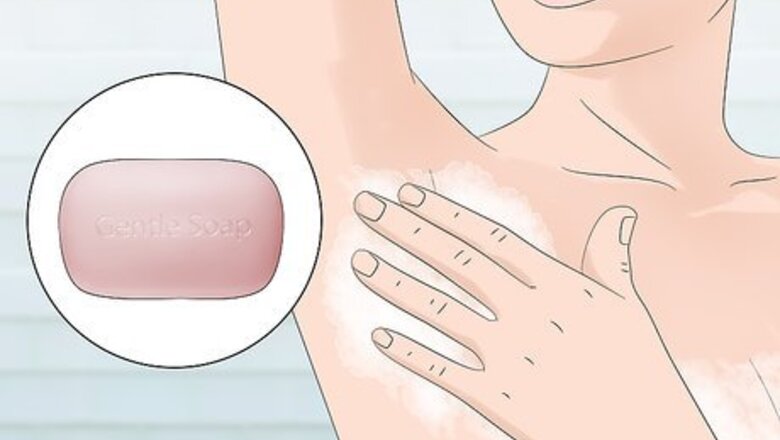
views
X
Trustworthy Source
Mayo Clinic
Educational website from one of the world's leading hospitals
Go to source
This might sound scary, but don’t worry! You can handle minor and serious cases of armpit pimples with some sanitary and lifestyle changes. Whether your armpit pimples are from simple acne or HS, these tips can help you get rid of them.
Practicing Good Armpit Care
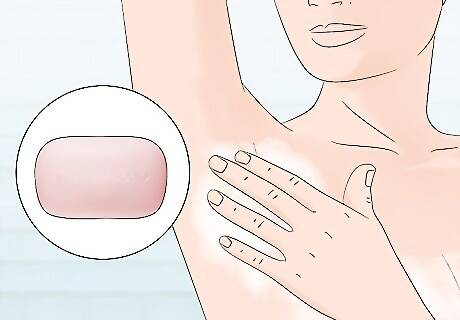
Wash your armpits with a gentle cleanser. Practicing generally good hygiene can help clear existing breakouts and prevent future ones. Wash your armpits with a gentle non-abrasive cleanser when you bathe to keep the area clean and free of sweat. Try not to scrub your armpits or rub hard. This could irritate the pimples and make them worse. Cleansers can also relieve discomfort, speed up healing, and prevent flare-ups.
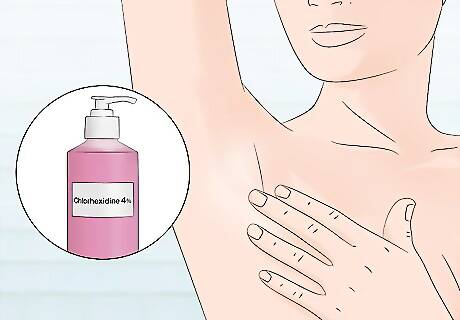
Try an antiseptic wash to clean your skin if regular soap doesn’t help. If HS is causing your bumps and sores, then a stronger cleaner might work better. Try applying an antiseptic wash like 4% chlorhexidine daily alongside other treatments to treat HS. Antiseptics like chlorhexidine might be a little harsh on your skin if you aren’t used to them. Start by using it once a week to make sure it doesn’t irritate your skin, then increase your use to once daily. If you need a recommendation for a good antiseptic cleanser, ask your dermatologist for the best options.
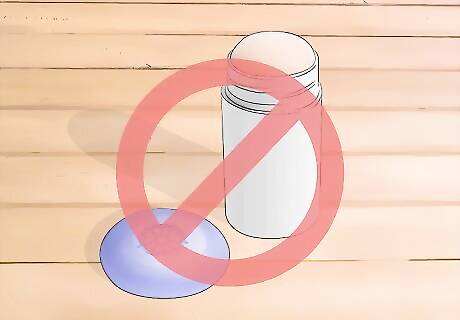
Avoid fragranced soaps or deodorants. Fragrances and perfumes can irritate your skin and might trigger HS breakouts. It’s best to use soaps and deodorants that don’t contain alcohol, baking soda, parabens, dyes, or fragrances. This might help prevent more irritation and flare-ups. Make sure all the products you use are labeled “Fragrance-free.” If your acne is due to contact dermatitis, look for hypoallergenic products designed for sensitive skin to reduce irritation.
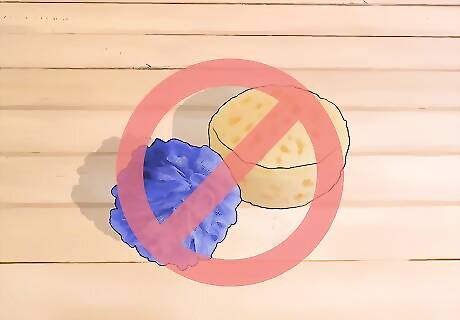
Try not to use a washcloth or loofah in your armpits. You might be tempted to scrub your armpits hard to keep them as clean as possible, but this is a mistake! Scrubbing the area with washcloths, loofahs, sponges, or other items can irritate the skin. Just use your fingertips and a gentle cleanser to wash your armpits. This can keep the area plenty clean. Loofahs, washcloths, and synthetic sponges can also harbor and breed bacteria, which could cause infections.
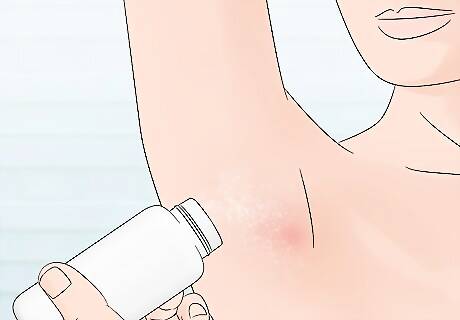
Apply antifungal powder, ointment, or cream if you have a yeast infection. If the pimples under your armpit are from a yeast infection, your dermatologist may prescribe an antifungal medication. Your health care provider might recommend a cream, ointment, powder, or in some cases, an oral medication. Keep your underarms clean and dry as part of the treatment. Expose your armpits to air or use a drying powder or topical antiperspirant to dry out your skin and prevent future infections.
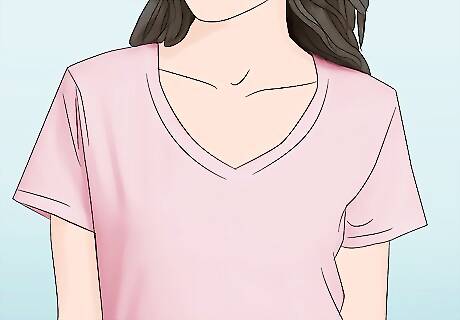
Wear loose-fitting clothes to prevent friction in your armpits. Tight clothes can irritate your skin, which can trigger more breakouts. If your HS flares up when wearing tight clothes, try wearing looser shirts that don’t rub on your armpits to see if this helps. If you often get pimples in other places like your back, then wearing loose-fitting clothes that don’t rub on these spots can also help.
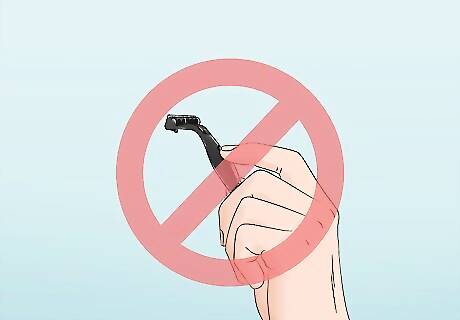
If you shave, use antibacterial soap and a gel-to-foam shaving gel. If you shave, take extra precautions to avoid nicks and cuts, which can cause a new HS sore or infection. Before you shave, wash the area with an antibacterial soap, then apply a gel-to-foam shaving gel. Shave carefully around your HS sores. Dermatologists recommend never to wax your armpits because you could irritate the skin, which may cause more HS. If you want to get rid of armpit hair, talk to your dermatologist about laser hair removal. Avoid razor bumps by shaving with a sharp razor and using proper shaving cream.
Relieving Pain and Discomfort
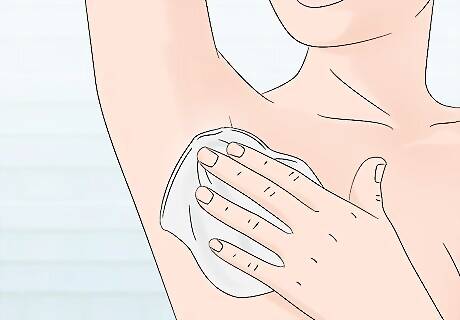
Hold a warm compress on the pimples. Place a clean washcloth under warm running water. Wring out the extra water and make sure it’s cool enough to press onto your skin without any pain. Then hold it onto your armpit pimples for 10 minutes at a time and repeat several times throughout the day to relieve pain. Always test the washcloth to make sure it’s cool enough first so you don’t get burned.
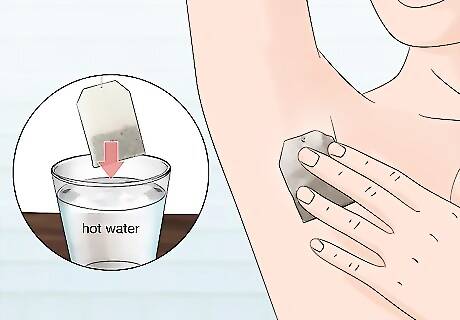
Try using a black tea bag to reduce pain. This sounds weird, but it might be an effective home remedy for treating pain from pimples. Boil some water, then steep a teabag of black tea in the water for 10 minutes. Place a clean cloth or gauze in a clean container and pour the tea over the cloth. Wring out the excess liquid and press the cloth against your pimples for 10 minutes. Repeat several times as needed to reduce the pain. Make sure the teabag is cool before pressing it onto your skin. Otherwise, you could get burned.
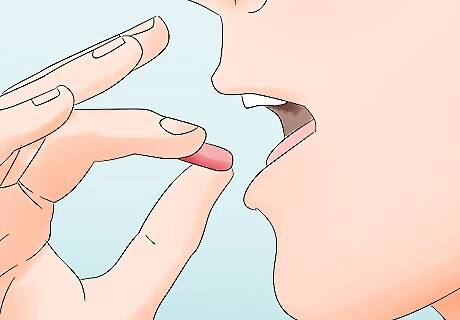
Take pain relievers if you’re very uncomfortable. Pimples in your armpit can be painful and home remedies might not do the trick for you. This is okay, and you can take care of the pain with some over-the-counter pain relievers. Take all pain medication according to the product instructions so you don’t use too much. OTC pain relievers might be enough for most people, but if you’re in a lot of pain, your healthcare provider might be able to prescribe something stronger or refer you to a pain clinic.
Trying Medical Treatments
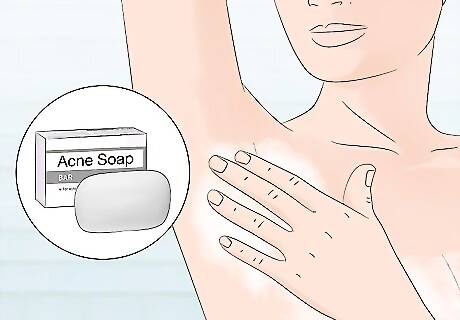
Wash your armpits with acne soap. Acne soap isn’t just for your face. Specialized acne soaps are designed to clear pimples and prevent new breakouts. When you visit your dermatologist, they may recommend using acne soap in your armpits. Replace your normal soap with acne cleansers like benzoyl peroxide or salicylic acid to see if it helps clear your pimples. Some acne soaps are available over the counter, and some need a prescription. Use the one that your dermatologist recommends.
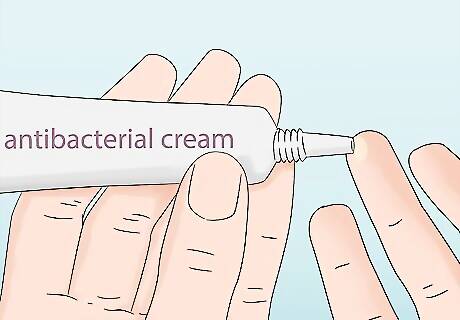
Fight the infection with antibiotic creams. This is a common treatment for acne and HS, and your dermatologist might prescribe it to manage your symptoms. Antibiotic gels or liquids can reduce inflammation and get rid of the bacteria that might cause more breakouts. Apply this liquid or gel according to your dermatologist’s instructions to help your skin heal. Common topical antibiotics include clindamycin and erythromycin. Your dermatologist might prescribe one of these or a different one. For more serious cases, your doctor may also try prescribing oral antibiotics to fight the infection. Check with your doctor to make sure no underlying diseases are causing your pimples (like hidradenitis suppurativa).
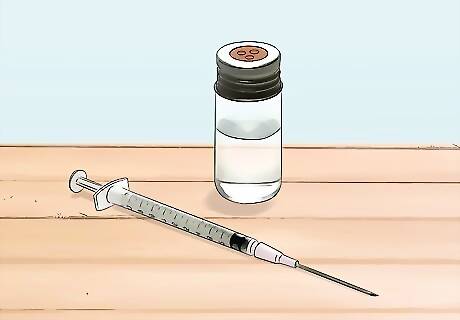
Take retinoids or steroid medications to control inflammation. For more serious cases of HS, your dermatologist may prescribe retinoids or corticosteroids (topical steroid creams). These medications can reduce swelling and inflammation and could help treat breakouts. Steroid medications can be taken as tablets, topical creams, or injections.
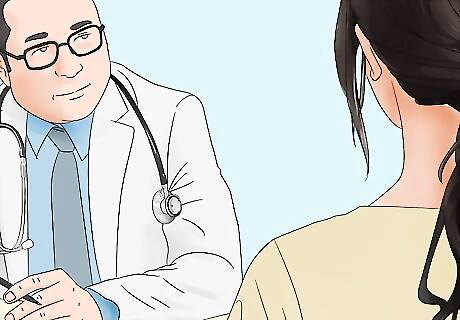
Fix damage from HS with minor surgical procedures. In rare cases, severe HS could cause scarring or tunneling in your skin. This sounds bad, but the problem is fixable. If you do have skin damage from repeated HS breakouts, talk to a dermatologist. They might recommend one of the following treatments to heal your skin. Unroofing is a procedure that exposes the tunnels under your skin. It can help with moderate to severe HS cases. There are also limited unroofing procedures for single nodules or cysts. Individual cysts or growths can be surgically removed in a simple punch debridement procedure. Laser therapy could help make nodules or lesions go away, especially in early HS stages. After this treatment, sores are unlikely to return. For very severe cases, the dermatologist may remove all of the infected skin and perform a skin graft to close the area.
Reducing Breakouts with Lifestyle Tips
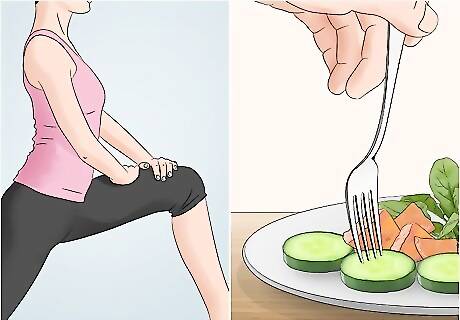
Lose weight to prevent HS breakouts. For overweight patients, losing weight can reduce flare-ups and prevent HS from worsening. Try following a diet and exercise routine to get down to a healthy weight. In some studies, people with HS saw their HS go away after they lost weight. If you start an exercise regimen, remember to shower as soon as possible when you’re done! Sweating and overheating can worsen HS. If you aren’t sure what a healthy body weight is for you, talk to your doctor to come up with a weight-loss plan.
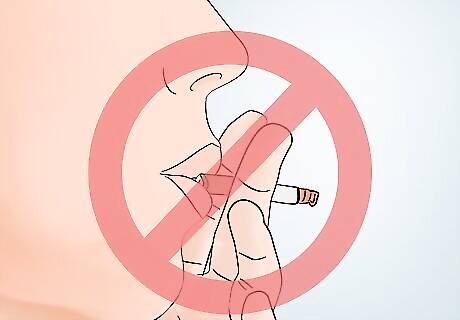
Quit smoking or don’t start in the first place. Quitting smoking can reduce HS flare-ups and prevent your condition from worsening. If you smoke, quitting as soon as possible can be the best choice. If you don’t smoke, then try to avoid starting at all. Besides HS, smoking can also cause cancer, heart disease, stroke, lung diseases, diabetes, and chronic obstructive pulmonary disease (COPD).
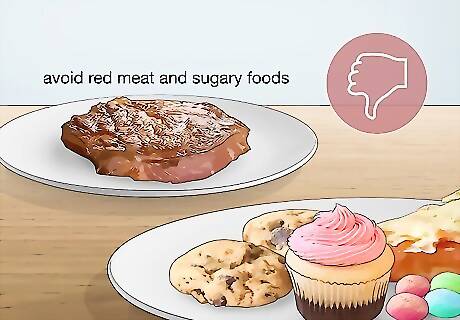
Follow a healthy diet. It’s possible that your diet could be causing your HS breakouts as well. High amounts of dairy, red meat, and sugary foods with a high glycemic index (GI) might put you at a higher risk for breakouts. Try limiting these foods in your diet. A diet with low-GI foods and less dairy might help prevent acne in other places as well. However, using acne-friendly skin care and medication is proven to help prevent breakouts.
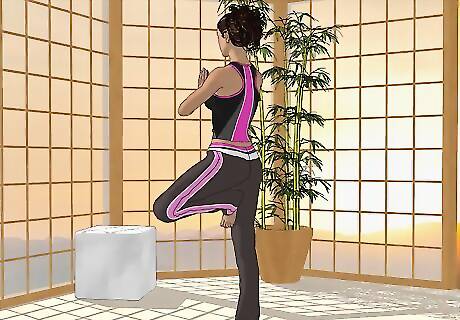
Reduce stress to prevent breakouts. If you have HS, stress could make your condition worse. Stress is also linked to acne breakouts. If you often feel stressed out, then taking some steps to reduce it can be a big help. Relaxation exercises like meditation, yoga, or deep breathing can release stress and anxiety. Make time each day for one of these activities. Doing things you enjoy is also a great way to reduce stress, so remember to leave time for your hobbies as well.




















Comments
0 comment